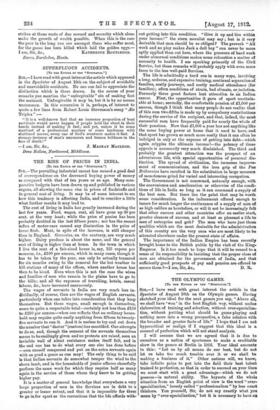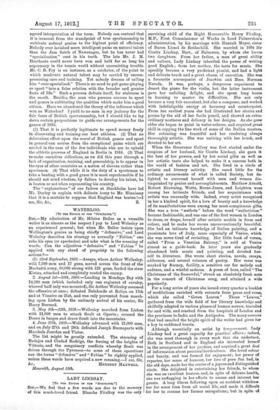THE OLYMPIC GAMES.
rro THE EDITOR OF THE "SPECTATOR.'?
SIR, —I have read with great interest the article in the Spectator of August 10th on the Olympic games. Having sketched your ideal for the next games you say, " Above all, we shall have `won' in the best English way, without undue elaboration of training and selection, without over-specializa- tion, without putting what should be game-playing and nothing more into a wrong perspective, a false relation with the broader and greater facts of life." I hope that I am not hypercritical or malign if I suggest that this ideal is a counsel of perfection which will not stand analysis.
I will assume that we are agreed that it is due to ourselves as a nation of sportsmen to make a creditable show in the games at Berlin in 1916. Your ideal amounts to this : " Let us by all means do our best, but do not let us take too much trouble over it or we shall be making a business of it." Other nations will, we know, take infinite pains to put into the field their best talent trained to perfection, so that in order to succeed on your lines we must start with a great advantage—which we do not possess—in natural ability. The keynote of the whole situation from an English point of view is the word " over• specialization," loosely called " professionalism " by less exact thinkers. You yourself, Sir, do not say exactly what you mean by "over-specialization," but it is necessary to have an
agreed interpretation of the term. Nobody can contend that it is immoral from the standpoint of true sportsmanship to cultivate natural genius to the highest point of efficiency. Nobody ever lavished more intelligent pains on natural talent than the Jam Sahib of Nawanagar, but he has never had "specialization" cast in his teeth. The late Mr. J. M. Heathcote could never have won and held for so long his supremacy in the tennis world without unremitting trouble. Mr. C. B. Fry is an instance, as a cricketer, of the point to which moderate natural talent may be carried by uncom- promising care and training. Yet nobody dreams of calling him "over-specialized." There is no need to put game-playing or sport " into a false relation with the broader and greater facts of life." Such a process defeats itself, for staleness is the result. Besides, the man who pursues success in sport and games is cultivating the qualities which make him a good citizen. Have we abandoned the theory of the influence which won us Waterloo P I yield to no man in my jealousy for the fair fame of British sportsmanship, but I should like to lay down certain propositions to guide our arrangements for the games of 1916.
(1) That it is perfectly legitimate to spend money freely in discovering and training our best athletes. (2) That no deleterious effect upon the moral of British games and sport in general can accrue from the exceptional pains which are needed in the case of the few individuals who are to uphold the athletic prowess of England in Berlin in 1916. (3) That to make ourselves ridiculous, as we did this year through a lack of organization, training, and generalship, is to appear in the eyes of other countries as a nation of slovens rather than sportsmen. (4) That while it is the duty of a sportsman to take a beating with a good grace it is most reprehensible if he should not mind whether, by failure to develop his talent, he is beaten or not when representing his country.
The "explanations" of our failure at Stockholm have led Mr. Dooley to explain with delicate irony to Mr. Hinnissey that it is a mistake to suppose that England was beaten !—I







































 Previous page
Previous page